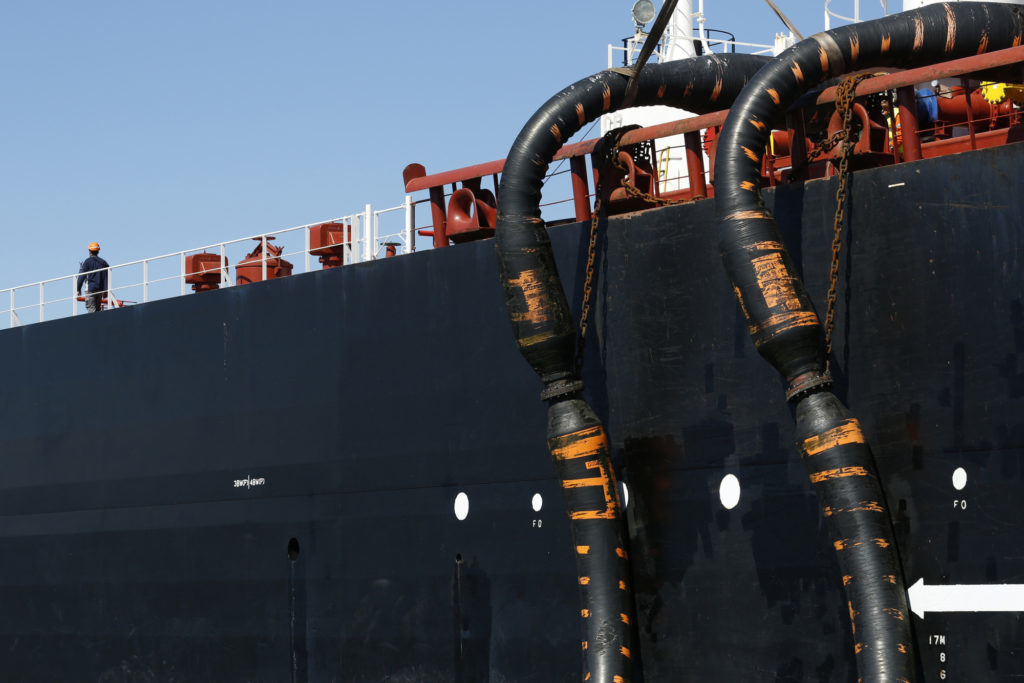
An intensifying trade war between the U.S. and China is scaring hedge funds away from an increasingly volatile oil market.
Money managers’ total positions in the U.S. benchmark and Brent have slid to the lowest since 2016. Tensions between Washington and Beijing show no signs of easing, with the Asian giant announcing Friday that it has prepared a list of $60 billion worth of U.S. goods to hit with tariffs in retaliation for duties proposed by the Trump administration.
The crude market was also roiled by reports that the U.S. hasn’t been able to persuade the world’s second-biggest economy to cut Iranian oil imports. Implied volatility for second-month West Texas Intermediate oil futures jumped to the highest since 2017 last month.
There are “no signs whatsoever that this trade war is going to clear up anytime soon,” said Tamar Essner, an analyst at Nasdaq Inc. in New York. That’s “caused investors to continue to trim net length, take profits and de-risk that position with the sense that oil’s upside is limited unless there’s material reduction in Iranian barrels.”
China’s largest refiner, Sinopec, will hold off on buying U.S. crude as the escalating trade battle threatens to make American imports more expensive, according to a person familiar with the matter. The move comes as President Donald Trump has directed U.S. Trade Representative Robert Lighthizer to consider increasing proposed tariffs on $200 billion in Chinese goods to 25 percent from 10 percent.
Meanwhile, a refusal by China to cut Iranian oil purchases would deal a blow to Trump’s efforts to isolate the Islamic Republic after his withdrawal from the 2015 nuclear accord. The U.S. has warned that even allies would face sanctions if they didn’t show “significant” progress in reducing Iranian oil purchases by Nov. 4, ruling out broad exemptions or waivers.
Oil traders had anticipated that sanctions would take Iranian barrels off the market, said Rob Haworth, who helps oversee $151 billion at U.S. Bank Wealth Management in Seattle.
But “if China is not participating in that — they are a pretty big consumer of Iranian crude oil — that leaves global production at a somewhat higher level,” he said.
Hedge funds’ net-long position — the difference between bets on higher prices and wagers on a drop — in West Texas Intermediate crude fell 1.4 percent to 386,764 futures and options during the week ended July 31, the lowest in six weeks, according to the U.S. Commodity Futures Trading Commission. Longs fell and shorts increased.
U.S. crude exports have been seesawing over the past month, falling 51 percent in the week ended July 27 after an 84 percent increase the week earlier, according to the latest Energy Information Administration Data.
“We’ve seen volatility in the export volumes of crude oil from the U.S.,” Essner said. “If we lose a partner in China in terms of buying those barrels,” it will hurt the U.S. benchmark relative to Brent.
OTHER POSITIONS:
The Brent net-long position rose to 372,346 contracts and short positions declined, ICE Futures Europe data show. Money managers increased their net-long position on benchmark U.S. gasoline by 16 percent. Hedge funds boosted their net-bullish position on diesel by 5.3 percent.
Recommended for you
